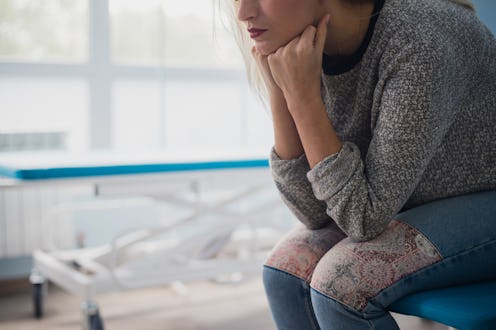Health
8 Reasons Why Your Vagina May Hurt During Your Period
Plus, what to do about it.

Studies report that nearly 85% of people with periods experience period pain. But when you think of pain during your period, you probably think about cramps, which typically occur in the lower abdomen or lower back. Some people, however, also experience vaginal pain during their period. This can be a side effect of the typical processes associated with menstruation, or it could point toward an underlying problem.
"If you feel like you have to hold your vagina and take a moment to breathe in and out when you're on your period, realize that you're not alone," reproductive endocrinologist and OB/GYN Dr. Aimee Eyvazzadeh, M.D., tells Bustle. Dr. Eyvazzadeh adds that it's common to feel a little bit of pain, but if the pain is significant, interferes with your life, or occurs outside your period, there could be other circumstances that are contributing to vaginal or vulvar pain. What's more, there could be a cure.
A good rule of thumb, Dr. Eyvazzadeh says, is that if NSAIDs like aspirin and ibuprofen aren't enough to relieve the pain, you should get evaluated by a doctor. There are many different ways to prevent or reduce vaginal pain during your period, so if there's an undiagnosed condition that's making your period pain intolerable, medical intervention could lead to more answers and less distress. Read: you shouldn't have to suffer once a month.
Here are some reasons that might explain why your vagina hurts during your period more than it should.
1Engorgement
It's not uncommon for your whole pelvic area to swell up during your period, Astroglide's resident OB-GYN Dr. Angela Jones, M.D., tells Bustle. "Your body retains more fluid from the hormones associated with your period," she explains. When your vaginal and vulvar tissue becomes engorged, the tissue can feel painful. This is especially common among those with a history of varicose veins in the vulva or vagina, Dr. Jones says.
2Hormonal Changes
The hormones responsible for period pain are known as prostaglandins. These are typically the source of period cramps, but the pelvic nerves can also transfer the pain to the vagina, thighs, or butt, aesthetic gynecologist Dr. Moushumi Shoma Datta, M.D., tells Bustle.
Fluctuations of hormones like estrogen and progesterone can also cause vaginal pain by creating changes in vaginal pH that make it more sensitive, Dr. Jones adds.
3A Vaginal Septum
If you have trouble inserting tampons, experience pain during your period or during sex, it could be a vaginal septum — a rare congenital condition in which the reproduction system does not fully form. It presents as a barrier of tissue dividing the inside of the vagina, Dr. Eyvazzadeh says. Since the barrier is internal, you won't be able to see it, and it doesn't always lead to symptoms. That said, if your doctor determines that you do have a vaginal septum, it can be removed.
4Vaginitis
Vaginitis is vaginal inflammation potentially caused by bacterial vaginosis or yeast infections. While you might have symptoms of vaginitis month-round, changes in vaginal pH during menstruation can make them flare up, Dr. Datta says. If you notice itching or an unusual smell along with the pain, go to the doctor to get evaluated for conditions causing vaginitis.
5Hematocolpos
Another rare, but potential cause of pain in the vagina is hematocolpos — the collection of blood that is unable to flow out of the uterus. This blockage is usually due to congenital structural defects of the vagina, like an a imperforate hymen, Dr. Eyvazzadeh says. Hematocolpos may also cause missing periods or abdominal pain. It can be treated by treating the imperforate hymen, usually through a minor surgical procedure.
6Endometriosis
In people with endometriosis, tissue similar to the uterine lining grows outside the uterus, which can cause severe period pain. "If there is an implant of these abnormal cells at the vagina, they are stimulated by the hormone changes during the period and may cause a pain exacerbation," Dr. Datta says.
Other signs of endometriosis include painful sex and painful urination or bowel movements. Endometriosis is typically diagnosed and treated via a procedure called a laparoscopy, so it's important to talk to your doctor if you think this may be the issue.
7Fibroids
These uterine tumors are benign, but in some cases, they can place pressure on the vagina. "Fibroids may become especially engorged due to menstrual hormone changes and cause increased discomfort at that time," Dr. Datta says. A few other signs of fibroids are heavy periods and frequent urination. Fibroids can be diagnosed via a pelvic exam and/or imaging tests and treated with medications or surgery, depending on the severity.
8Pelvic Floor Spasm
Pelvic floor spasm occurs when your vaginal muscles get into a chronic state of contraction. "While this pain is not always specific to periods, some women report it more at this time especially on attempting tampon insertion," Dr. Datta says. Pelvic floor spasm can be diagnosed and treated via pelvic floor physical therapy.
While talking about vaginal discomfort can be uncomfortable in and of itself, it's important to know that unrelenting pain around your period is not a normal sentencing that you have to endure. Even if your pain is not caused by a medical condition, it can often be reduced by lifestyle changes and medication.
Sources:
Dr. Angela Jones, M.D
Dr. Moushumi Shoma Datta, M.D.
This article was originally published on